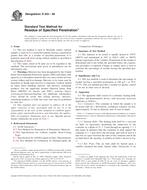We need your consent to use the individual data so that you can see information about your interests, among other things. Click "OK" to give your consent.
ASTM D243-08
Standard Test Method for Residue of Specified Penetration
STANDARD published on 15.7.2008
The information about the standard:
Designation standards: ASTM D243-08
Note: WITHDRAWN
Publication date standards: 15.7.2008
SKU: NS-20351
The number of pages: 3
Approximate weight : 9 g (0.02 lbs)
Country: American technical standard
Category: Technical standards ASTM
Annotation of standard text ASTM D243-08 :
Keywords:
asphalt, cutback, penetration, residue, road oil, Asphalts, Heating tests--asphalts, Penetration--bituminous materials, Residue, Road oil, Semi-solid materials, ICS Number Code 93.080.20 (Road construction materials)
Additional information
| Significance and Use | ||||||||
|
This test method is used to determine the percentage of residue having a specified penetration at 100 g/5 s at 25°C (77°F). This test method provides a residue for quality control or for use in other tests as desired. |
||||||||
| 1. Scope | ||||||||
|
1.1 This test method is used to thermally reduce cutback asphalt, a road oil or a semisolid asphalt, having a penetration greater than 100, to a residue of specified penetration. It is primarily used with slow-curing cutback asphalt as specified in Specification D 2026. 1.2 The values stated in SI units are to be regarded as the standard. The inch-pound units given in parentheses are for information only. 1.3 Warning—Mercury has been designated by the United States Environmental Protection Agency (EPA) and many state agencies as a hazardous material that can cause central nervous system, kidney and liver damage. Mercury, or its vapor, may be hazardous to health and corrosive to materials. Caution should be taken when handling mercury and mercury containing products. See the applicable product Material Safety Data Sheet (MSDS) for details and EPA’s website—http://www.epa.gov/mercury/faq.htm—for additional information. Users should be aware that selling mercury, mercury-containing products, or both, into your state may be prohibited by state law. 1.4 This standard does not purport to address all of the safety concerns, if any, associated with its use. It is the responsibility of the user of this standard to establish appropriate safety and health practices and determine the applicability of regulatory limitations prior to use. Specific precautionary statements are given in Note 2. |
||||||||
| 2. Referenced Documents | ||||||||
|
We recommend:
Technical standards updating
Do you want to make sure you use only the valid technical standards?
We can offer you a solution which will provide you a monthly overview concerning the updating of standards which you use.
Would you like to know more? Look at this page.




 Cookies
Cookies
